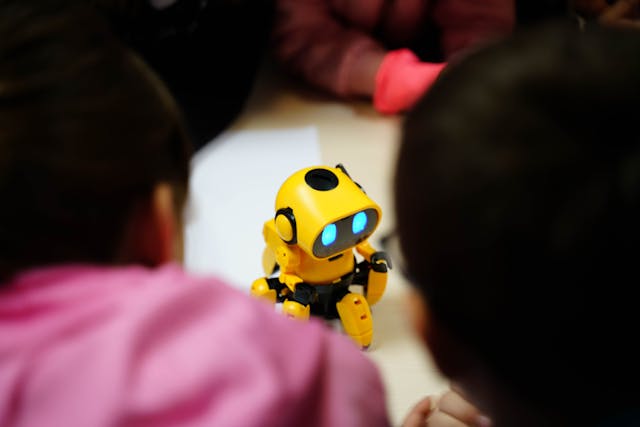Theme:
- Artificial Intelligence is being used more and more in the education sector to support online classes, assess student performance, and provide customised learning experiences. With technology becoming a bigger part of learning, many wonder ‘Is AI capable of fully replacing human teachers?’
Arguments in favour – AI can replace teachers:
- AI can actively engage students emotionally and socially through creative methods like storytelling, gamification, and simulations. These methods are traditionally associated with human teachers because they help instill values and social skills. So, if AI can do this effectively, it challenges the idea that only human teachers can nurture values and emotional intelligence, making AI a more complete and capable substitute, not just for academics but for holistic education.
- With developments in conversational AI, robots like humanoid teachers can talk, gesture, and even show emotions, creating an interactive and life-like classroom experience. Advanced AI is now capable of recognising facial expressions, tone of voice, and typing patterns to detect emotional states. With proper programming, AI can respond with empathy and suggest suitable actions, just like a teacher offering emotional support
- With AI’s guidance, students can become more independent learners. The role of a teacher as a guide may no longer be needed if students can explore and grow with AI support.
Arguments against – Teachers can’t be replaced by AI:
- Teachers don’t just teach subjects, they teach by example. Students observe how teachers behave, handle problems, and treat others. AI can simulate behaviour, but it cannot be a living role model with real-life integrity or values.
- AI might recognise emotions, but it doesn’t feel them. Students, especially children, need a real human presence to feel understood, supported, and cared for, which AI may not offer.
- AI works on patterns and data. It cannot truly handle unpredictable classroom situations like calming down a student’s anxiety, managing a sudden outburst, or guiding a shy child to open up, all of which require emotional intelligence and intuition.
- A great teacher can turn a boring topic into an inspiring lesson with stories, jokes, or real-life connections. AI might present information, but it cannot inspire curiosity or spark deep thought the way a passionate teacher can.
- Many students open up to teachers about personal issues or future goals. That bond of trust and mentorship plays a huge role in shaping students’ lives. AI can’t replace that human relationship.
- AI may unintentionally teach something insensitive or culturally inappropriate without realising it. Teachers can apply wisdom, cultural understanding, and ethics.
- Students often learn through questions, mistakes, and open discussions. A teacher can guide that process with flexibility and compassion.
Way forward:
- The future of education lies in combining the best of both worlds, which means using AI for smart content delivery and progress tracking, and using teachers for mentorship, creativity, and emotional guidance.
- Schools should focus on training teachers to use AI-powered platforms in their classrooms. This will make lessons more interactive, personalised, and efficient without losing the human touch.
Conclusion:
Although AI brings many benefits to education, it still lacks the emotional intelligence, human connection, and life experiences that real teachers offer. The future of education should not be about choosing between AI and teachers, but about finding the right balance where both can work together to improve learning for all students.
Photo by Vladimir Srajber
Your Turn…
What are your thoughts on this topic? Do you think AI can replace teachers in the near future? Express your point of view through the comment section. Subscribe to our blog to read answers to the trending GD topics.
Copyright @ Group Discussion Ideas.

